LMB PhD students and postdoctoral researchers are awarded prizes for breakthroughs in human brain development, DNA replication, yeast GPCRs, dynein motor delivery and ubiquitylation of LPS
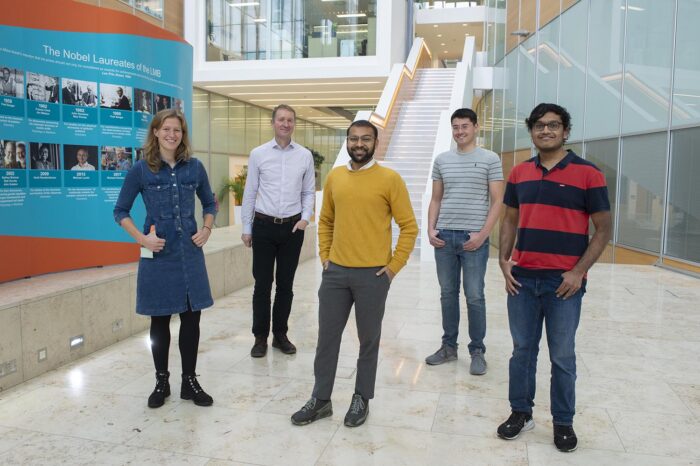
At the culmination of an inspiring LMB Lab Symposium, LMB Director Jan Löwe was thrilled to announce the 2021 winners of the Perutz Student Prize and Brenner Postdoc Prize.
The Perutz Student Prize, awarded annually by the Max Perutz Fund since 1984, is given in recognition of outstanding work performed at the LMB prior to the award of a PhD. The 2021 Prize has been jointly awarded to three students: Michael Jenkyn-Bedford, Silvia Benito Kwiecinski and Vaithish Velazhahan.
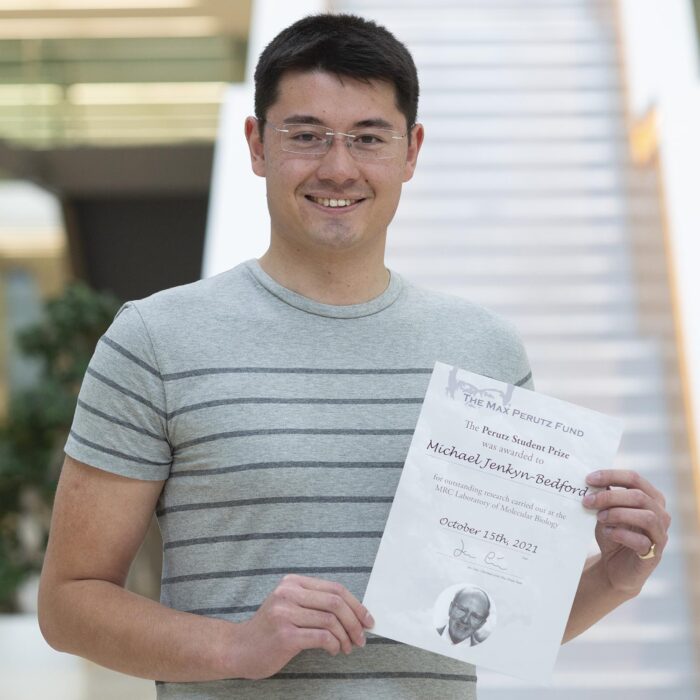

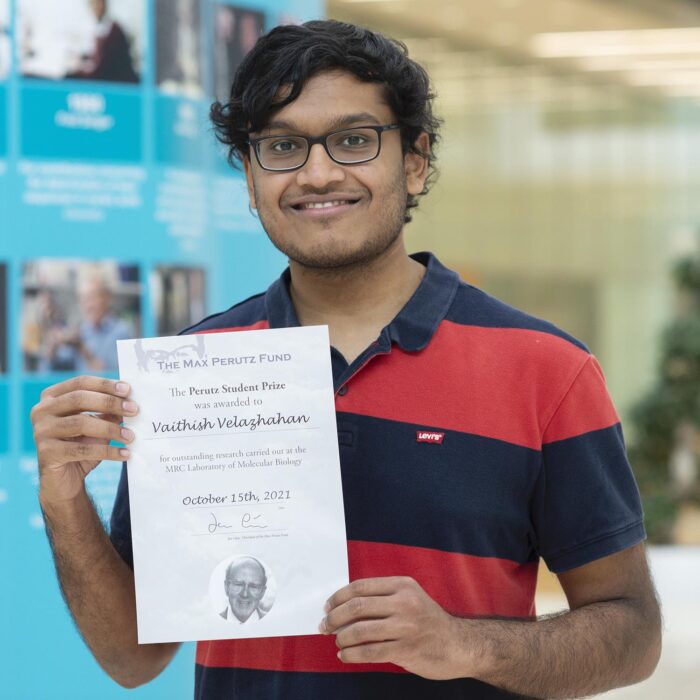
Michael, a PhD student in Joseph Yeeles’ group, has worked out important mechanisms of DNA replication termination, a fundamental aspect of the life cycle of cells. During termination, fork convergence leads to the ubiquitination and disassembly of the replisomes. Michael’s exciting work on the cryo-EM structure of a terminating yeast replisome and biochemical reconstitutions revealed in detail how the replication fork’s lagging-strand regulates the ubiquitination reaction and blocks disassembly. Michael also showed that an analogous mechanism exists in humans. Congratulations Michael!
“I am grateful for my work investigating the structure of the DNA replication machinery to be recognised by the award of this Prize. It is always a privilege to work at the LMB, and to have had the chance to collaborate with the many wonderful people without whom this work would not have been possible.”
Silvia recently completed a PhD in Madeline Lancaster’s group and is now a postdoc at the Sloan Kettering Institute, New York. She tackled a key question in neurobiology, namely why human brains are comparatively larger than those of other primates. Silvia discovered that the cells in human brain organoids have a different shape to cells in other primate brain organoids. In a series of remarkable experiments, she then showed that the shape differences are caused by delayed expression of the transcription factor ZEB2. These novel findings revealed that differences in gene expression cause differently shaped primate brains. Congratulations Silvia!
“It’s such an honour to have my work recognised in this way and receiving this award is the perfect ending to my time at the LMB. I joined Madeline’s lab wanting to study what makes the human brain unique, and it is exciting to have identified a mechanism that may have been a key contributor to human brain size evolution.”
Vaithish, a PhD student in Chris Tate’s group, solved the structures of yeast GPCRs, which remained poorly understood. Vaithish’s highly insightful series of structures revealed that a yeast dimeric GPCR undergoes rearrangements that are remarkably different from those reported for human proteins. These structures not only explain the large library of yeast mutants that had been previously identified but also raise the possibility of fungal-specific inhibitors that would address a major human disease burden. Congratulations Vaithish!
“I am thrilled and humbled that my PhD work over the past three years on the structure determination of fungal GPCRs has been recognised with the Perutz Prize. This work provided new paradigms for how a dimeric GPCR gets activated, and I am now investigating how this translates to human GPCRs. I am also very excited about the prospects for anti-fungal drug development using our high-resolution structural information, which may eventually help develop novel treatments to combat numerous deadly fungal infections.”
The Brenner Postdoc Prize, made possible through a sponsorship from Royalty Pharma through the Max Perutz Fund, rewards exceptional LMB postdoctoral researchers who have been in post for less than six years. The 2021 Prize has been jointly awarded to Gisela Otten and Girish Ram Mali.
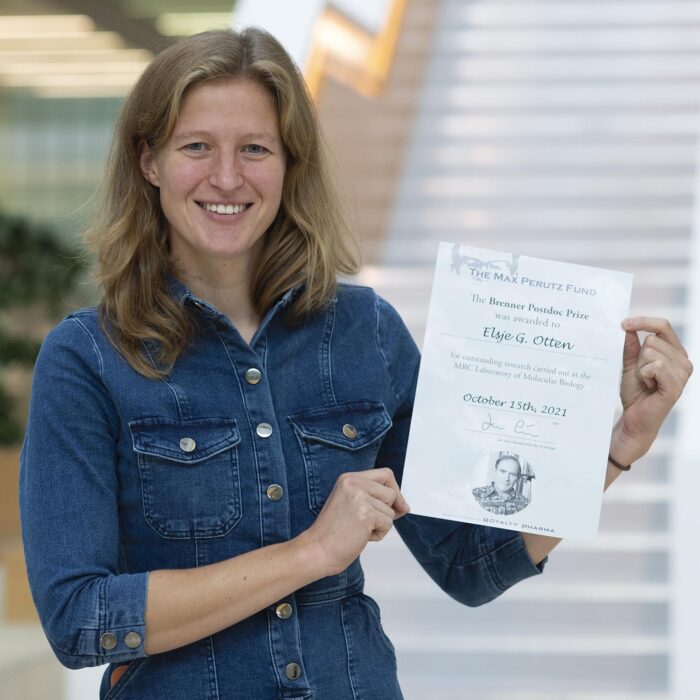
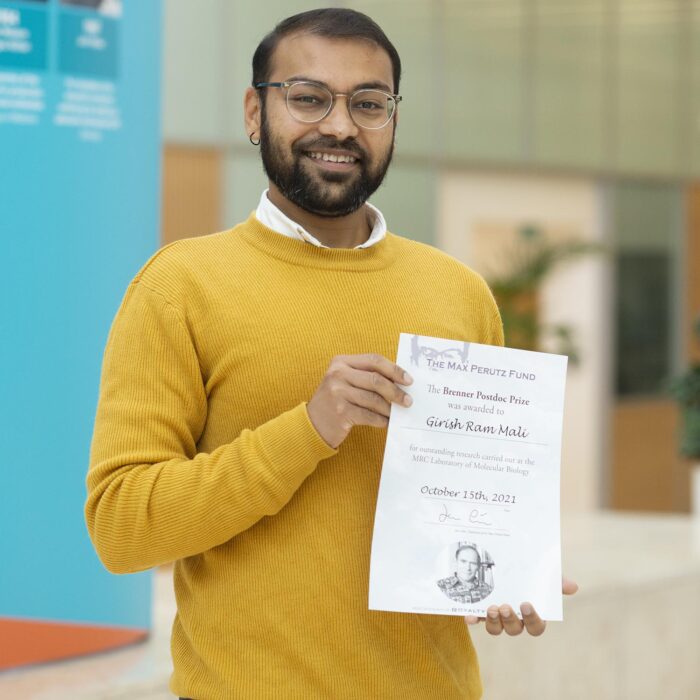
Gisela Otten, a postdoc in Felix Randow’s group, worked on an important and challenging problem aimed at identifying the ubiquitin ligase that modifies lipopolysaccharide (LPS), a crucial step in the defence against bacteria that have entered cells. She developed an assay to track the activity of the elusive enzyme and through rigorous biochemical approaches identified RNF213. Gisela’s remarkable work identified, for the first time, an E3 ligase that modifies a non-proteinaceous substrate. Congratulations Gisela!
“I feel incredibly thankful for winning the Brenner Prize. It has been so encouraging and humbling to see my work recognised and the positive response from the ubiquitin field has been overwhelming. I would like to thank Emma Werner and the entire Randow lab, because it has been an amazing team effort! It’s exciting how the discovery of ubiquitylation of LPS has resulted in more questions than answers. Biology is so complex and beautiful and I can’t wait to step-by-step explore and understand more of it.”
In an outstanding body of work, Girish, a postdoc in Andrew Carter’s group, discovered a protein he named Shulin that packages dynein motors for delivery to cilia. Girish took the initiative to set up the system that allowed the biochemical isolation of dynein and its associated proteins to discover Shulin. He went on validating the genetic importance of Shulin, characterising its function and solving the structure of the complex to unravel how dynein is modified by Shulin. Congratulations Girish!
“I am humbled to receive the Brenner Prize for my postdoctoral work on behalf of a wonderfully collaborative team. This work typifies the research ethos of the LMB – discovery driven by cooperation and I am particularly proud of this aspect. The discovery of the dynein inhibitory factor Shulin also sheds light on an entirely new family of proteins that regulate the assembly of these molecular motors in the cell. Now, I am excited to shift my research focus to uncover the molecular mechanisms of this new family of proteins in my own lab at the University of Bristol.”
The Max Perutz Fund was established in 1980 in honour of LMB’s co-founder Max Perutz in order to promote and advance education and research in molecular biology and allied biomedical sciences. In addition to the Prizes, the Fund also provides awards for student travel and postdoctoral fellowships.
Further references
Max Perutz Fund
Previous Perutz Student Prize Winners
Previous Brenner Postdoc Prize Winners